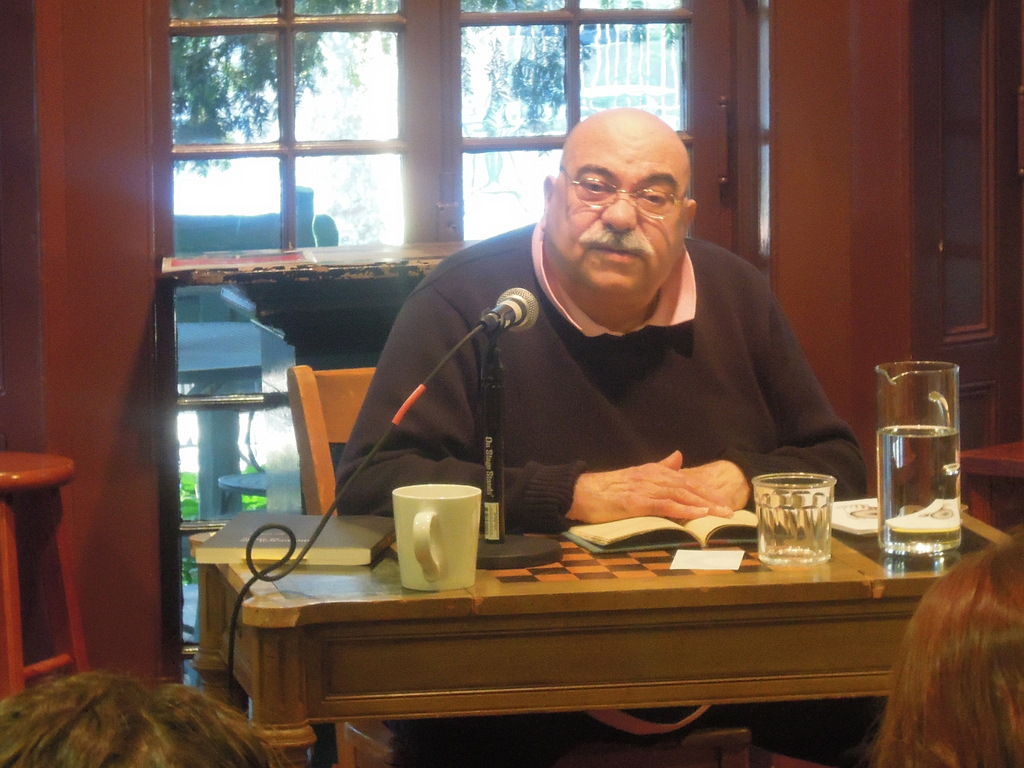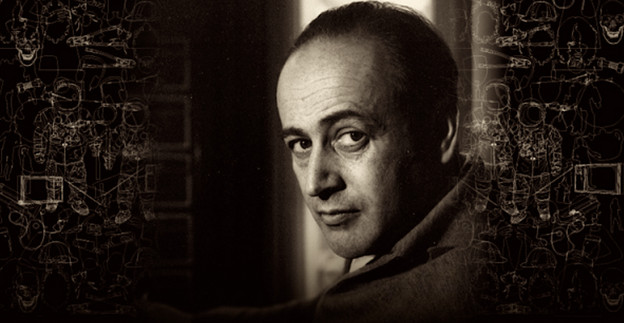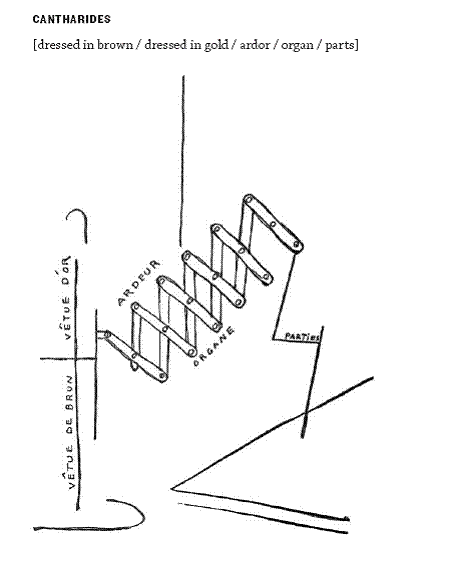|
|
Posted 12/2/2016 (link)
 Our latest author page is for Bay Area-poet Joseph Lease, who is the author of a number of collections, including Testify, Broken World, Human Rights, and The Room.
His PennSound author page starts with a trio of single tracks recorded by A.L. Nielsen (who also provided the photo at left) in the Bay Area on an unknown date: "Bay Area Poetry Marathon," "Broken World," and "Litquake." That's followed by a half-hour reading at San Francisco's Books & Bookshelves on September 17, 2009. Two more brief offerings round out the set: "America," taken from issue #3 of textsound, and recording from Boulder, Colorado's Left Hand Bookstore made in 1999.
You can listen to all of these recording by clicking here.
Posted 12/5/2016 (link)
 Our listeners might already be aware of "Intermedium," the amazing 2015 Jacket2 commentary series Kristin Dykstra wrote on "recognitions and convergences that give rise to bodies of work in translation." Now, at our invitation, Dykstra has written a new article on the current state of Cuban poetry after the easing of diplomatic tensions between that country and the US.
Titled "The Sea Doesn't Have to Be a Wall," this piece was published last Friday. It's a potent document that deftly offers history lessons, reveals cultural contexts, shatters readers' misconceptions, and, much like her commentary series, mixes in a healthy dose of first-person reportage from friends and colleagues on the island and within the Cuban diaspora. Taken together, these perspectives provide a fascinating and vital portrait of a diverse and thriving poetic community, along with a clear sense of what has and hasn't changed. It's a particularly timely piece — Dykstra even made slight emendations after the death of longtime Cuban leader Fidel Castro — that's a must-read for fans of international poetry.
Posted 12/7/2016 (link)
 In a year that's already been oppressive when it comes to death and dying — both within and outside of the world of poetry — we sadly have one more passing to record. Poet Ray DiPalma, an integral member of the early NYC L=A=N=G=U=A=G=E group, has passed away at the age of seventy-three.
Our own Charles Bernstein has shared a brief remembrance of the poet, recalling their close friendship prior to his move to Buffalo and their last meeting a little over a month ago, concluding "He was upbeat. Looking up and outward. I see him sitting on one of those tall coffee shop stools. The image is burning a hole in my brain."
Bernstein introduced DiPalma's April 2012 reading at our own Kelly Writers House (from which the photo above is taken), and that lengthy set, along with a Studio 111 session recorded the next day, form the foundation of our Ray DiPalma author page. There you'll also find a 1999 KWH reading, numerous Segue Series readings (from 1977, 1979, 1980, 1992, and 1993), a 1977 reading at Anthology Film Archives, and a truly fascinating artifact: the L E G E N D group reading from 1981, where four-fifths of that collaborative work's authors (Bernstein, DiPalma, Ron Silliman, and Bruce Andrews) recorded themselves reading from the book at Andrews' apartment.
We send our condolences to those who knew and loved DiPalma, as well as to fans of his work. You can reconnect through the simple act of listening by clicking here.
Posted 12/9/2016 (link)
 Earlier this week we released episode #107 in the PoemTalk Podcast series, in which host Al Filreis leads a panel that includes Pierre Joris, Ariel Resnikoff, and Anna Strong in a discussion of Paul Celan's poem, "Corona."
Filreis begins his introduction on the PoemTalk blog by providing a little context for the poem and the translation in use here: "Celan had chosen to continue writing in German after the elimination of Jews from his town and the murder of his parents by the Nazis and their fascist allies — and maintained, to the say the very least, a complex relationship to the mother tongue he kept using with increasingly inventive disfiguration. There was a good deal of knowledge of the original difficult German in our Wexler Studio, although as PoemTalk is an English-language podcast series we focused on the challenges of the English translation. Our translation was done by Jerome Rothenberg in the late 1950s for his groundbreaking anthology New Young German Poets (1959, City Lights)." You can read more on Jacket2.
PoemTalk is a co-production of PennSound, the Kelly Writers House, Jacket2 and the Poetry Foundation. If you're interested in more information on the series or want to hear our archives of previous episodes, please visit the PoemTalk blog, and don't forget that you can subscribe to the series through the iTunes music store.
Posted 12/12/2016 (link)
 PennSound co-director Charles Bernstein recently posted the following note: "At MoMA's not to be missed Picabia show, there is too-slight acknowledgement of the MIT Press selection of his poems, translated by Marc Lowenthal, who passed through Buffalo Poetics. I posted this excerpt on in 2008. MoMA plays a recording of an unidentified reader reciting the translations in a way that, try as I might, standing under the speaker, I could not make out. MoMA does not display any of the texts of the poems they play nor do they translate the French that appears in several of Picabia's visual works. None of this takes away from the greatness of the show, but a lost opportunity."
Towards that end, we're starting this new week by highlighting the aforementioned selection of poems from I Am a Beautiful Monster: Poetry, Prose, and Provocation, made available via the the EPC Library through the generosity of MIT Press. That page also includes Bernstein's back-cover blurb for the book: "Francis Picabia's raucous early poems, which dare the unprecedented and traffic in the sheer possibilities of abstract shimmering gesture. His late aphorisms are startling bolts of congealed thought. Marc Lowenthal has done the history of radical modernist poetry a great service by bringing these works of exquisitely offbeat taste and intoxicating élan into English. His translations of the turbulent work of this 'freeloading angel' show uncanny skill and welcome verve."
Posted 12/14/2016 (link)
 It's been almost exactly six months since we launched our Kate Colby author page and today we're highlighting a very exciting new addition: a comprehensive, career-spanning session, recorded at our own Kelly Writers House's Wexler Studio on November 2nd of this year.
In total, there are forty-eight tracks, the final of which — from the forthcoming collection, The Arrangements (Four Way Books, 2018) — is itself segmented into twenty-five individual brief poems. Aside from that volume, there are generous selections from The Return of the Native (Ugly Duckling Presse, 2011), Fruitlands (Litmus Press, 2006), Blue Hole (Furniture Press, 2015), Beauport (Litmus Press, 2010), and Unbecoming Behavior (Ugly Duckling Presse, 2008).
You'll find all of these poems, plus several full-length readings, a few individual tracks, and Colby's introductions to a number of readings at the Gloucester Writers Center by clicking here.
Posted 12/19/2016 (link)
 Here's a fantastic, not to mention historic, event to start off this last week before the holidays: Naomi Replansky reading at our own Kelly Writers House on November 15th of this year. As PennSound co-director Al Filreis notes in his introduction, "In twenty years of the Writers House we've had important moments, great readings, poets. [...] I've been here for all those twenty years, and this is a really special night for us."
He continues, tracing her long and fruitful aesthetic life — Replansky will turn ninety-nine next May 23rd — noting that "much of the 20th century she spent thinking about poetry, being a poet, caring about poetry, and about political poetry and about politics." He continues, praising her early and continued passion for leftist perspectives, observing that "all along she has put the lie to simplistic caricatures of radical poetry and political poets," and traces her critical successes and her run-ins with the likes of George Oppen and Gertrude Stein, while imploring the audience (both in person and those watching vicariously) to rush out to buy her recent Collected Poems.
The format for this one-hour event is somewhat unconventional, following the mode — as fits the occasion — of one of Filreis' Kelly Writers House Fellows conversations, with Replansky reading poems and Filreis intermittently chiming in to ask questions on what she'd just read, along with audience members like Rachel Blau DuPlessis and Ron Silliman. You can watch the complete reading here. While you're there, don't miss out on the other recordings contained therein, including a number of comprehensive readings from Replansky's own body of work as well as poems by some of her favorite authors (which come to us courtesy of Richard Swigg). There's also a Close Listening conversation with Filreis and Charles Bernstein recorded this spring. You'll find all of these marvelous recordings here.
Posted 12/21/2016 (link)
 The winter solstice took place at 5:44 this morning. As we've done for the past few years, we encourage you to celebrate what might or might not be the longest night of the year with Bernadette Mayer's classic long poem, Midwinter Day, written in its entirety on the occasion of the winter solstice at 100 Main Street in Lennox, Massachusetts on December 22, 1978.
As Megan Burns notes in her Jacket Magazine essay on the book: "A long held tradition on Midwinter's Day was to let the hearth fire burn all night, literally keeping a light alive through the longest night of winter as a source of both heat and a symbol of inspiration to come out the other side of the long night closer to spring and rebirth. It is fitting that a poem about surviving death and the intimacy of the family would be centered around this particular day that traditionally has focused on both. The hearth is the center of the home where the family gathers, where the food is cooked and where warmth is provided. Metaphorically, the poem Midwinter Day stands in for the hearth gathering the family into its folds, detailing the preparation of food and sleep and taking care of the family's memories and dreams."
Mayer read a lengthy excerpt from the book at a Segue Series reading at the Ear Inn on May 26th of the following year, which you can listen to on her PennSound author page along with a wide array of audio and video recordings from the late 1960s to the present.
|
PennSound Daily archive
2025
2024
2023
2022
2021
2020
2019
2018
2017
2016
2015
2014
2013
2012
2011
2010
2009
2008
2007
|








